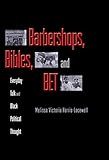Barbershops, Bibles, and BET : Everyday Talk and Black Political Thought / Melissa Victoria Harris-Lacewell.
Material type: TextPublisher: Princeton, NJ : Princeton University Press, [2010]Copyright date: ©2004Description: 1 online resource (368 p.) : 4 halftones. 12 line illus. 19 tablesContent type:
TextPublisher: Princeton, NJ : Princeton University Press, [2010]Copyright date: ©2004Description: 1 online resource (368 p.) : 4 halftones. 12 line illus. 19 tablesContent type: - 9780691114057
- 9781400836604
- 320.50899607
- online - DeGruyter
- Issued also in print.
| Item type | Current library | Call number | URL | Status | Notes | Barcode | |
|---|---|---|---|---|---|---|---|
 eBook
eBook
|
Biblioteca "Angelicum" Pont. Univ. S.Tommaso d'Aquino Nuvola online | online - DeGruyter (Browse shelf(Opens below)) | Online access | Not for loan (Accesso limitato) | Accesso per gli utenti autorizzati / Access for authorized users | (dgr)9781400836604 |
Frontmatter -- Contents -- Tables -- Figures -- Acknowledgments -- Introduction -- Chapter One: Everyday Talk and Ideology -- Chapter Two: Ideology in Action: The Promise of Orange Grove -- Chapter Three: Black Talk, Black Thought: Evidence in National Data -- Chapter Four: Policing Conservatives, Believing Feminists: Reactions to Unpopular Ideologies in Everyday Black Talk -- Chapter Six: Speaking to, Speaking for, Speaking with: Black Ideological Elites -- CHAPTER Seven: Everyday Black Talk at the Turn of the Twenty-first Century -- Notes -- Bibliography -- Index
restricted access online access with authorization star
http://purl.org/coar/access_right/c_16ec
What is the best way to understand black political ideology? Just listen to the everyday talk that emerges in public spaces, suggests Melissa Harris-Lacewell. And listen this author has--to black college students talking about the Million Man March and welfare, to Southern, black Baptists discussing homosexuality in the church, to black men in a barbershop early on a Saturday morning, to the voices of hip-hop music and Black Entertainment Television. Using statistical, experimental, and ethnographic methods Barbershops, Bibles, and B.E.T offers a new perspective on the way public opinion and ideologies are formed at the grassroots level. The book makes an important contribution to our understanding of black politics by shifting the focus from the influence of national elites in opinion formation to the influence of local elites and people in daily interaction with each other. Arguing that African Americans use community dialogue to jointly develop understandings of their collective political interests, Harris-Lacewell identifies four political ideologies that constitute the framework of contemporary black political thought: Black Nationalism, Black Feminism, Black Conservatism and Liberal Integrationism. These ideologies, the book posits, help African Americans to understand persistent social and economic inequality, to identify the significance of race in that inequality, and to devise strategies for overcoming it.
Issued also in print.
Mode of access: Internet via World Wide Web.
In English.
Description based on online resource; title from PDF title page (publisher's Web site, viewed 30. Aug 2021)


